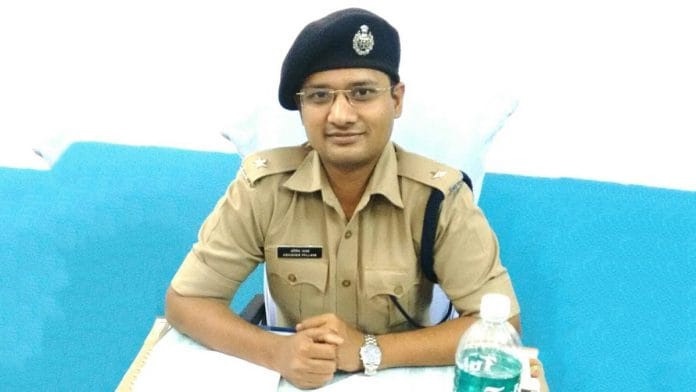Abhishek Pallava, a 2012-batch IPS officer, is the SP of Dantewada, and has been successful in winning over the people through his ‘humane’ approach.
New Delhi: Journalists were assured of a safe passage in poll-bound Chhattisgarh, and most reporters were going about their business with a few armed guards — more for guidance than protection from Maoists. That is until Monday, when more than 150 armed Naxalites opened fire on a convoy of three mediapersons and seven policemen in Dantewada.
Fifteen minutes later, Dantewada’s superintendent of police Abhishek Pallava and his team reached the spot. But the stand-off went on for 45 minutes. Two policemen and a journalist lost their lives, while two other policemen were injured.
This wasn’t the first time Pallava reached a scene where people were in a critical condition. After all, he is a doctor-turned-Indian Police Service (IPS) officer working in a highly-sensitive insurgency-hit area.
But it was one of those times he couldn’t do anything. “We waited for an ambulance. They were beyond our power to save,” he said, barely managing to hold back tears in a video that went viral.
Pallava is no stranger to the limelight, having changed the discourse of policing in Chhattisgarh. While he is known as an encounter specialist, his ‘humane’ approach has won many hearts in his two-year stint in the state.
Also read: If I raised my head 4 inches I would be shot: DD crew member who survived Maoist attack
A soft touch
A psychiatrist by training from the All India Institute of Medical Sciences (AIIMS), Pallava believes in “smart, intelligence-based, humane operations”. Tapping into people’s feelings and understanding their motives helps him structure his operations better. He and his team have worked tirelessly to increase the trust of the people in the police.
“We organise kabbadi tournaments for the villagers, and festivity training camps for fellow police officers,” he says.
The camps help Central Reserve Police Force (CRPF) personnel from all over the country connect with the locals, learn their language, and reach out to them more effectively. It is especially crucial in a state that has often been accused of using excessive force.
“Even my own constables often come to me with their problems. It helps to talk, even more so if the Naxals are spreading panic and propaganda in the area,” Pallava says.
In March 2017, Pallava made headlines for saving the life of a Naxal, Somaru, whom he had shot during an operation. He was the additional SP of Bastar at the time.
“At the end of the day, they are our people. I couldn’t leave him there to die,” he says.
While on the lookout for another Naxal leader, Pohru, he stumbled upon his ailing wife and malnourished kids in January 2018. His kind words, and much-needed medication, persuaded them to seek treatment at the local hospital.
“We need both approaches — soft policing and hard policing. Soft policing helps build trust on the ground. The trust, in turn, helps counter-insurgency,” he says.
According to Pallava, there is increased fear and insecurity in Naxal factions, which has made them undisciplined. “Our soft approach has won over villagers in some parts. Naxals are scared that if they go to them, they’ll be caught,” he says.
Also read: Remember, it was the Congress that messed up India’s fight against Naxals
A family man
Pallava’s five-year-old son, Advik, goes to school in Dantewada. His wife, also a doctor, works in the Dantewada district hospital. They spend their evenings together, chatting over meals, when he is not otherwise engaged.
“My friends and family tried to discourage me from moving to Chhattisgarh. They told me I have cushy job in Delhi, why would I want to leave it for a jungle?”
But being the son of an Army man and having studied in Army schools all his life, Pallava knew that despite being a doctor at AIIMS, he would eventually strive for the IPS, which he joined in 2012.
“I wanted to work in insurgency-hit areas, Chhattisgarh was one of my top picks,” he says. It is there that he found his purpose, his calling.
“I do what I feel is right. Yes, sometimes people criticise me, but I will always work to change their minds,” he says.







Good & courageous job sir. God Bless but plz don’t throw yours & your family’s, staff’s safety & security. Especially, when you dealing with media as they are bound to breach their Brief risking not only their lives others too. As you are aware that the Naxals use these situation to show their one upmenship & to creat a rift between government & media. Luckily both of them has not lost their senses. It is unfortunate & sad that an innocent life has been lost.
The Urban, Rural, Regional Naxal supporters must take note of this, forget about going to these places at least none has criticized this killing. Be-firm & take it to the logical conclusion. Yes as you are rightly pointed out, they are loosing ground but for some politicians & Big contractors, so called intellectuals support trying to re group & Re-establish themselves. Of late the courts are also observing these tendencies. The Time has come to deal with Iron fist & destroy the Naxals & their Network. Tx.